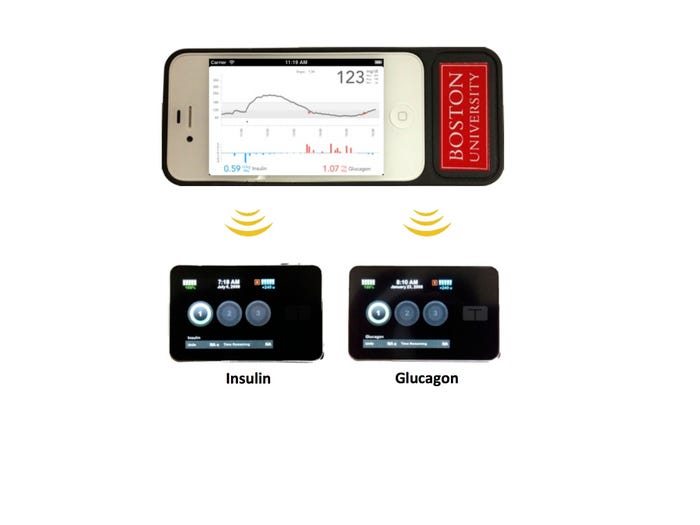Father Develops Bionic Pancreas for Diabetic Son; Results in NEJM
June 17, 2014
It's a good thing that David Damiano's dad is Edward R. Damiano, PhD, an associate professor of biomedical engineering at Boston University.
When David, now 15, was 11 months old, he was diagnosed with Type 1 diabetes. Faced with the necessity of managing his son's condition, Damiano senior shifted the focus of his research and began to work on a better way to regulate blood sugar. Fast forward some 14 years, and Damiano's 'bionic pancreas' has been tested on 52 teenagers and adults and has done a better job of controlling blood sugar than the subjects typically did on their own.
In association with lead author Steven J. Russell, MD, PhD, and a number of other authors, the results of this work, "Outpatient Glycemic Control with a Bionic Pancreas in Type 1 Diabetes," have now been published in the New England Journal of Medicine.
|
Researchers from Boston University have developed a promising smartphone-powered bionic pancreas. |
The device is basically a smartphone running a sophisticated app that is wirelessly connected to a blood sugar monitor and two infusion pumps, one administering insulin and the other, glucagon, a hormone that raises blood sugar when it gets too low. The monitor measures blood sugar every five minutes and determines the amount of insulin or glucagon needed.
"The bionic pancreas is a device that automatically takes care of your blood sugars 24/7," Damiano told NPR's Rob Stein. "It's a device that comes to know you."
Refresh your medical device industry knowledge at MEDevice San Diego, September 10-11, 2014. |
In an ABC News article by Kaidi Wang, MD, Damiano said that participants in the study were so satisfied with the bionic pancreas during the five days that they used it that they did not want to give it up at the end of the trial.
"The emotional response [of the participants] was something we could never have anticipated," he said. "They embraced it and they saw it as a complete game changer."
Stein reports that Damiano hopes to win the FDA's approval just in time for his son David's first night alone in his dorm room. For his part, David is confident his dad's bionic pancreas will be ready in time.
"My whole life I've just known -- just had this knowledge that my dad is going to have this bionic pancreas out when I go to college," David says. "I'm confident in him. He works really hard -- really hard."
Stephen Levy is a contributor to Qmed and MPMN.
About the Author(s)
You May Also Like



